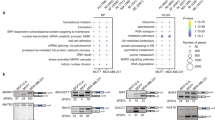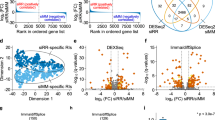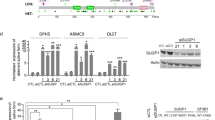Abstract
The TSG101 gene, identified through insertional mutagenesis, is localized in a region that exhibits LOH in human cancers, suggesting that TSG101 might be a tumor suppressor gene. Numerous studies have then shown the presence of abnormal transcripts in various tumors which appear to result from aberrant splicing of the gene, rather than from intragenic deletions. Moreover, many studies demonstrated that these aberrantly spliced transcripts were not found in matched normal tissues. We have analysed TSG101 transcripts in 85 breast cancer samples and found that abnormal splicing of the gene is tightly correlated with tumor grade and p53 mutation. In addition, stress induced the appearance of these abnormal transcripts in primary lymphocytes. Hence, TSG101 splicing defects, while unrelated to the oncogenic process per se, could reflect the cellular environment of the tumor cells. The proposed role of stress and hypoxia to select p53 mutant cells could account for the tight association with p53 status.
This is a preview of subscription content, access via your institution
Access options
Subscribe to this journal
Receive 50 print issues and online access
$259.00 per year
only $5.18 per issue
Buy this article
- Purchase on Springer Link
- Instant access to full article PDF
Prices may be subject to local taxes which are calculated during checkout

Similar content being viewed by others
References
Besnard-Guerin, Newsham I, Winqvist R and Cavenee WK. . 1996 Hum. Genet. 97: 163–170.
Bloom HJG and Richardson WW. . 1957 Br. J. Cancer 11: 359–377.
Carney M, Maxwell G, Lancaster J, Gumbs C, Marks J, Berchuck A and Futreal P. . 1998 J. Soc. Gynecol. Invest. 5: 281–285.
Chang J, Su T, Wei H, Wang J, Chen J, Chang C and Jeng C. . 1999 Br. J. Cancer 79: 445–450.
Chomczyniski P and Sacchi N. . 1987 Anal. Biochem. 162: 156–159.
Coles C, Condie A, Chetty U, Steel CM, Evans HJ and Prosser J. . 1992 Cancer Res. 52: 5291–5298.
Coquelle A, Toledo F, Stern S, Bieth A and Debatisse M. . 1998 Mol. Cell 2: 259–265.
Flaman JM, Frebourg T, Moreau V, Charbonnier F, Martin C, Chappuis P, Sappino AP, Limacher JM, Bron L, Benhatter J, Taka M, Van Meir EG, Estreicher A and Iggo RD. . 1995 Proc. Natl. Acad. Sci. 92: 3963–3967.
Gayther SA, Barski P, Batley SJ, Li L, de Foy KAF, Cohen SN, Ponder BAJ and Caldas C. . 1997 Oncogene 15: 2119–2126.
Graeber TD, Osmanian C, Jacks T, Housman DE, Koch CJ, Lowe and Giaccia AJ. . 1996 Nature 379: 88–91.
Hallier M, Lerga A, Barnache S, Tavitian A and Moreau-Gachelin F. . 1998 J. Biol. Chem. 273: 4838–4842.
Hallier M, Tavitian A and Moreau-Gachelin F. . 1996 J. Biol. Chem. 271: 11177–11181.
Knowles MA, Elder PA, Williamson M, Cairns JP, Shaw ME and Law MG. . 1994 Cancer Res. 54: 531–538.
Lamond AI. . 1995 Curr. Biol. 862–865.
Larsson SH, Charlieu J-P, Miyagawa K, Engelkamp D, Rassoulzadegan M, Ross A, Cuzin F, van Heyningen V and Hastie ND. . 1995 Cell 81: 391–401.
Lee MP and Feinberg AP. . 1997 Cancer Res. 57: 3131–3134.
Li L and Cohen S.N. . 1996 Cell 85: 319–329.
Li L, Li X, Francke U and Cohen SN. . 1997 Cell 88: 143–154.
Lin P, Liu T, Chang J, Chen T and Lin S. . 1998a Br. J. Haematol. 102: 753–758.
Lin S, Chen Y and Chang J. . 1998b J. Gastroenterol. Hepatol. 13: 1111–1114.
Lisuka M, Sugiyama Y, Shiraishi M, Jones C and Sekiya T. . 1995 Genes Chrom. Cancer 13: 40–46.
Oh Y, Proctor M, Fan Y, Su L, Hong W, Fong K, Sekido Y, Gadzar A, Minna J and Mao L. . 1998 Oncogene 17: 1141–1148.
Saitoh S, Cunningham J, De Vries EMG, McGovern RM, Schroeder JJ, Hartman A, Blaszyk H, Wold LE, Schaid D, Sommer SS and Kovach JS. . 1994 Oncogene 9: 2869–2875.
Sato T, Yuyama Y, Watabe K, Okazaki A, Toda K, Okazaki M and Hirata K. . 1997 Cancer Lett. 115: 47–55.
Silvestrini R, Daidone MG, Benini E, Faranda A, Tomasic G, Boracchi P, Salvadori B and Veronesi U. . 1996 Clin Cancer Res. 2: 2007–2013.
Steiner P, Barnes DM, Harris WH and Weinberg RA. . 1997 Nature Genet. 16: 332–333.
Sun Z, Pan J, Bubley G and Balk SP. . 1997 Oncogene 15: 3121–3125.
Valgardsdottir R, Tryggvadottir L, Steinarsdottir M, Olafsdottir K, Jonasdottir S, Jonasson JG, Ögmundsdottir HM and Eyfjörd JE. . 1997 APMIS 105: 121–130.
Wagner K, Dierisseau P, Rucker EI, Robinson G and Hennighausen L. . 1998 Oncogene 17: 2761–2770.
Waridel F, Estreicher A, Bron L, Flaman JM, Fontolliet C, Monnier P, Frebourg T and Iggo R. . 1997 Oncogene 14: 163–169.
Willeke F, Ridder R, Bork P, Klaes R, Mechtersheimer G, Schwarzbach M, Zimmer D, Kloor M, Lehnert T, Herfarth C and von Knebel Doeberitz M. . 1998 Mol. Carcinog. 23: 195–200.
Winqvist R, Hampton GM, Mannermaa A, Blanco G, Alavaikko H, Kiviniemi H, Taskinen PJ, Evans GA, Wright FA, Newsham I and Cavenee WK. . 1995 Cancer Res. 55: 2660–2664.
Acknowledgements
We thank Virginie Ignace Thibonnet, Brigitte Surin and the technicians of the pathology department for expert technical assistance.
Author information
Authors and Affiliations
Rights and permissions
About this article
Cite this article
Turpin, E., Dalle, B., de Roquancourt, A. et al. Stress-induced aberrant splicing of TSG101: association to high tumor grade and p53 status in breast cancers. Oncogene 18, 7834–7837 (1999). https://doi.org/10.1038/sj.onc.1203196
Received:
Revised:
Accepted:
Published:
Issue Date:
DOI: https://doi.org/10.1038/sj.onc.1203196



